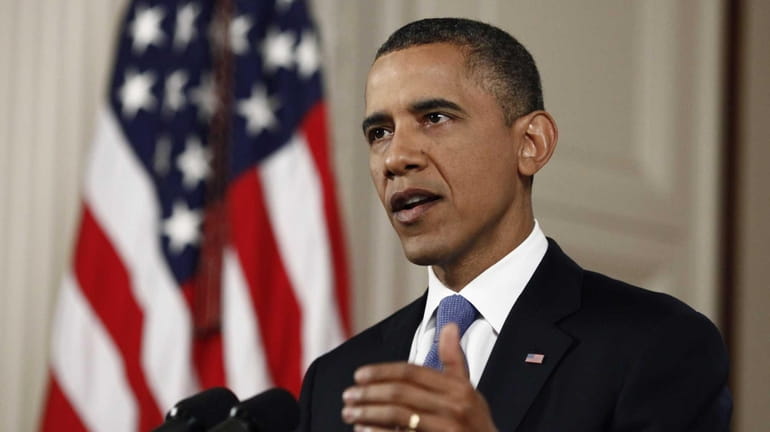'Branding' helps laws go down more easily

President Barack Obama speaks in the East Room of the White House. (June 28, 2012) Credit: AP
Promotional phrasing -- or propaganda, as some might call it -- routinely finds its way into the very titles and texts of our nation's laws.
In a world of short, half-understood slogans, these titles can serve as little billboards for an official act -- leaving opponents to scramble for negative, alternative nicknames.
President Barack Obama signed the Patient Protection and Affordable Care Act into law during his first year in office, approved while both houses of Congress were in Democratic hands. Protect patients? Make doctors affordable? How bad could that be?
In its provisions, of course, critics saw a violation of liberty. The law requires adults who are not covered by employers or government to go out and buy their own health insurance or pay a fine.
The U.S. Supreme Court upheld the law 5-4 last week. But in doing so, Chief Justice John Roberts gave detractors of the health-care act a consolation prize in the form of a new, negative counter-label -- a tax on the middle class.
In his opinion upholding so-called Obamacare, Chief Justice John Roberts angled the facts to fit the "taxing and spending" powers of Congress. Obama's Republican opponent, Mitt Romney, embraced this new description after first shunning it.
The power of labeling ranges well beyond Washington. Officials at all levels like to use titles of their proposals as advertisements.
Last year, New York enacted the Marriage Equality Act, to allow same-sex marriage. Fifteen years earlier, the federal Defense of Marriage Act defined marriage as the legal union of one man and one woman. Thus we had Equality versus Defense.
More recently, Nassau County Executive Edward Mangano chose the title "Debt Reduction and Sewer Stabilization Plan" in his effort to privatize operation of the county's wastewater treatment.
Sounds great. People have got to want to reduce their collective debt these days, and unstable sewers sound like a very bad thing for a county to have (though "pay as you go" might have sounded catchier).
The Nassau Interim Finance Authority rejected the Mangano plan, with board member Christopher Wright calling it a "one-shot" financing gimmick. "One-shots are bad," he said. "It's a very expensive loan."
Other legislative titles have become especially contrived in the service of creating a catchy acronym.
The 9/11 attacks prompted the "Uniting and Strengthening America by Providing Appropriate Tools Required to Intercept and Obstruct Terrorism Act" -- better known as the U.S. PATRIOT Act.
Such wording isn't entirely new. Forty-one years ago, the federal Racketeering Influenced and Corrupt Organizations Act was enacted, a thoroughly awkward name that gave way to the widely used acronym RICO. The name -- which always bore the smell of an ethnic slur -- may have originated with the gangster movie "Little Caesar" with Edward G. Robinson.
Other examples abound. The so-called Bush tax cuts were contained in the Jobs and Growth Tax Relief Reconciliation Act of 2003. Arizona's controversial immigration law was dubbed the Support Our Law Enforcement and Safe Neighborhoods Act. Critics derided one portion of it, upheld recently by the Supreme Court, as the "Show Me Your Papers" provision, a counter-label that caught on.
In politics, as in commerce, branding becomes key.
